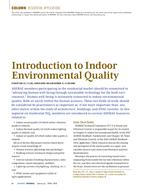Click here to purchase
The requirement for Heating, Ventilation and Air Conditioning (HVAC) demand increases gradually as a result of urbanization, increased demand of human living standards and global warming, HVAC systems are mainly used in buildings to maintain the thermal comfort of the occupants and consumes about 40% of the total energy consumption of the world. Inaddition, HVAC systems in the commercial buildings consume approximately 40%-60% of the total energy consumption by the buildings. It is mandatory to supply fresh air to conditioned spaces to maintain the Indoor Air Quality (IAQ) levels established by the standards. Increased fresh air demand requires more energy for air conditioning in extreme environmental conditions. The use of thermal wheel is a promising technique to reduce energy consumption of the HVAC system, which can be used to recover the energy available in the return air, unless otherwise wasted. It shows attractive energy savings and payback periods with comparative to other energy recovery devices. In this study, CFD modelling work has been performed to investigate the heat exchanging characteristics of the thermal wheel. Besides, an experimental program has also been conducted to validate the CFD modelling work. The validated CFD model has been used to analyze the performance of the thermal wheel for different rotational speeds of the thermal wheel. A contour of temperatures in thermal wheel has been obtained in the study. Moreover, it is recommended to operate the thermal wheels at a rotational speed of 10-30 RPM. Further, it was found that this optimum RPM depends on the geometry of the wheel matrix.
Product Details
- Published:
- 2022
- Number of Pages:
- 9
- Units of Measure:
- Dual
- File Size:
- 1 file , 3.1 MB
- Product Code(s):
- D-LV-22-C058
- Note:
- This product is unavailable in Russia, Belarus


